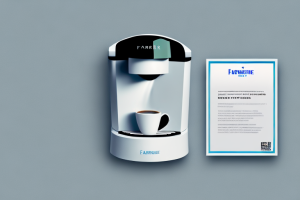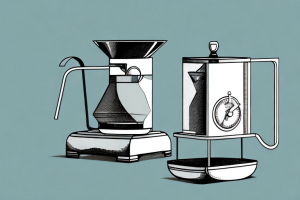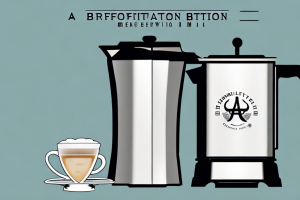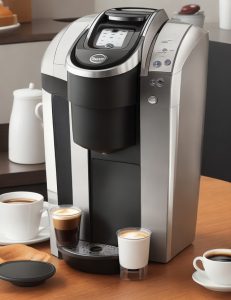Clean Kitchenaid Coffee Maker

A kitchen countertop with a kitchenaid coffee maker and its components
If you’re a coffee lover, chances are you rely on your Kitchenaid Coffee Maker to help you get through your day. As such an essential part of your daily routine, it’s important that you regularly clean and maintain it. In this article, we’ll go over everything you need to know to keep your Kitchenaid Coffee Maker running smoothly and producing delicious coffee.
Why Regular Cleaning of Your Kitchenaid Coffee Maker is Important
Regular cleaning of your Kitchenaid Coffee Maker not only ensures that your coffee tastes great but also helps prevent potential health hazards. The moisture and warmth of your coffee maker create the perfect breeding ground for mold and bacteria, which can lead to unpleasant odors and even make you sick. Additionally, buildup and residue can cause damage to your machine over time, which can eventually affect its performance.
It is recommended to clean your Kitchenaid Coffee Maker at least once a month to maintain its optimal performance and prevent any potential health risks. To clean your coffee maker, start by unplugging it and allowing it to cool down. Then, remove any removable parts such as the carafe, filter basket, and water reservoir and wash them with warm soapy water. Use a soft-bristled brush to clean any hard-to-reach areas. For the machine itself, mix equal parts of water and vinegar and run it through a brewing cycle. Finally, run a cycle with just water to rinse out any remaining vinegar. By following these simple steps, you can ensure that your Kitchenaid Coffee Maker stays in top condition and produces delicious coffee every time.
Understanding the Different Parts of Your Kitchenaid Coffee Maker
Before you start cleaning, it’s important to understand the different parts of your Kitchenaid Coffee Maker. There are several components that need to be cleaned regularly, including the water reservoir, carafe, filter basket, and heating element.
In addition to the components mentioned above, your Kitchenaid Coffee Maker may also have a frothing wand or milk frother. This component is used to create frothed milk for cappuccinos and lattes. It’s important to clean this component after each use to prevent milk residue from building up and affecting the taste of your coffee.
Tools and Materials You’ll Need for Cleaning Your Kitchenaid Coffee Maker
Fortunately, cleaning your Kitchenaid Coffee Maker is relatively easy and requires only a few basic tools and materials. You’ll need dish soap, white vinegar, a dishcloth or sponge, and a clean towel or paper towel.
Before you begin cleaning your Kitchenaid Coffee Maker, make sure to unplug it and let it cool down completely. This will prevent any accidents or injuries while cleaning. Additionally, it’s important to clean your coffee maker regularly to prevent the buildup of mineral deposits and bacteria that can affect the taste of your coffee.
To clean your coffee maker, start by filling the water reservoir with equal parts water and white vinegar. Run the coffee maker through a brewing cycle, then repeat the process with just water to rinse out any remaining vinegar. For the carafe and filter basket, wash them with warm soapy water and rinse thoroughly. You can also use a toothbrush to scrub any hard-to-reach areas.
Step-by-Step Guide to Cleaning Your Kitchenaid Coffee Maker
To clean your Kitchenaid Coffee Maker, here’s what you need to do:
- Unplug your machine and let it cool down completely.
- Empty any remaining water from the water reservoir and discard any used coffee grounds.
- Prepare a solution of one part white vinegar and one part water in the water reservoir.
- Run the machine through one cycle, using the vinegar solution as you would the coffee. Once the cycle is complete, discard the solution.
- Fill the water reservoir with clean water and run another cycle to rinse the machine.
- Wipe the outside of the machine with a damp cloth, being careful not to get any water inside the machine.
- Clean the carafe, filter basket, and other removable parts with warm soapy water and dry thoroughly.
- Replace all the parts and plug the machine back in.
It is recommended to clean your Kitchenaid Coffee Maker every 3-6 months to ensure optimal performance and longevity of the machine. Regular cleaning also helps to prevent any build-up of mineral deposits or bacteria that can affect the taste of your coffee. If you notice any unusual smells or tastes in your coffee, it may be time to clean your machine.
Tips for Deep Cleaning Your Kitchenaid Coffee Maker
If your machine hasn’t been cleaned in a while, you may want to consider a more thorough cleaning. One way to do this is to fill the water reservoir with a solution of one part white vinegar and two parts water. Run the machine through several cycles with this solution until the buildup has been removed. Once you’ve finished, rinse the machine with plain water several times to remove any leftover vinegar.
Another way to deep clean your Kitchenaid coffee maker is to use a descaling solution. This solution is specifically designed to remove mineral buildup and hard water deposits that can accumulate in your machine over time. Follow the instructions on the descaling solution carefully, as the process may vary depending on the brand you choose.
It’s important to note that regular cleaning and maintenance of your coffee maker can help extend its lifespan and ensure that it continues to produce high-quality coffee. In addition to deep cleaning, make sure to regularly clean the removable parts of your machine, such as the carafe and filter basket, with warm soapy water. And don’t forget to replace the water filter regularly, as this can also impact the taste and quality of your coffee.
How Often Should You Clean Your Kitchenaid Coffee Maker?
It’s recommended that you clean your Kitchenaid Coffee Maker at least once a month, but if you use it frequently, it’s a good idea to clean it more often. Pay attention to any unusual odors or tastes in your coffee, as this may indicate buildup or residue in your machine.
When cleaning your Kitchenaid Coffee Maker, be sure to follow the manufacturer’s instructions. Some models may require specific cleaning solutions or methods. Additionally, it’s important to regularly replace the water filter in your machine to ensure the best tasting coffee. Neglecting to clean your coffee maker can not only affect the taste of your coffee, but it can also lead to the growth of harmful bacteria. So, make sure to keep your Kitchenaid Coffee Maker clean and well-maintained for the best coffee experience.
Common Mistakes to Avoid When Cleaning Your Kitchenaid Coffee Maker
When cleaning your Kitchenaid Coffee Maker, it’s important to avoid some common mistakes. Never put your machine in the dishwasher, as the high heat can damage it. Additionally, be sure to rinse all the components thoroughly to remove any traces of cleaner or vinegar, as these can affect the taste of your coffee.
Another mistake to avoid is using abrasive cleaners or scrubbers on your coffee maker. These can scratch the surface and damage the machine. Instead, use a soft cloth or sponge to gently clean the exterior and interior of the coffee maker.
It’s also important to regularly clean the water reservoir and the coffee pot. Over time, mineral deposits can build up and affect the taste of your coffee. To clean the water reservoir, mix equal parts water and vinegar and run a cycle through the machine. For the coffee pot, fill it with hot water and a tablespoon of baking soda, let it sit for an hour, and then rinse thoroughly.
Benefits of Using Vinegar for Cleaning Your Kitchenaid Coffee Maker
Vinegar is an excellent cleaning agent because it’s natural, inexpensive, and effective. It helps remove buildup and residue from your machine without the use of harsh chemicals.
Another benefit of using vinegar for cleaning your Kitchenaid coffee maker is that it helps to eliminate any unpleasant odors that may be lingering in your machine. This is especially important if you use your coffee maker frequently, as the buildup of coffee oils and residue can create a stale smell over time.
Additionally, using vinegar to clean your coffee maker can help to extend the life of your machine. Regular cleaning can prevent clogs and other issues that can arise from a buildup of mineral deposits and other debris. By keeping your coffee maker clean and well-maintained, you can ensure that it continues to produce delicious coffee for years to come.
How to Clean the Water Reservoir of Your Kitchenaid Coffee Maker
The water reservoir of your Kitchenaid Coffee Maker should be cleaned regularly to prevent mold and bacteria. To do this, simply fill the reservoir with a solution of one part vinegar and one part water and let it sit for 30 minutes. Rinse thoroughly with clean water before using your machine again.
It is important to note that the carafe and filter basket of your Kitchenaid Coffee Maker should also be cleaned regularly. The carafe can be washed with warm soapy water and the filter basket can be rinsed with hot water after each use. Additionally, it is recommended to descale your coffee maker every 3-6 months to remove mineral buildup. To do this, fill the reservoir with a descaling solution and run a brew cycle. Rinse thoroughly with clean water before using your machine again.
Tricks for Removing Stubborn Stains and Buildup from Your Kitchenaid Coffee Maker
If you have stubborn stains or buildup in your machine, try using a mixture of baking soda and water to make a paste. Apply the paste to the affected areas and let it sit for 15 minutes before scrubbing with a sponge or cloth. Rinse the machine thoroughly with plain water before using it again.
Another effective method for removing stubborn stains and buildup is to use white vinegar. Fill the water reservoir with equal parts white vinegar and water, and run the machine through a brewing cycle. Once the cycle is complete, run the machine through another cycle with plain water to rinse out any remaining vinegar. This method can be repeated as necessary until the stains and buildup are completely removed.
It’s important to regularly clean your Kitchenaid coffee maker to prevent stains and buildup from forming in the first place. After each use, rinse the carafe and filter basket with hot water and wipe down the exterior of the machine with a damp cloth. Every few weeks, run a cleaning cycle with a commercial coffee maker cleaner to keep your machine in top condition.
How to Clean the Carafe and Filter Basket of Your Kitchenaid Coffee Maker
Cleaning the carafe and filter basket is simple and can be done with warm soapy water. Be sure to rinse them thoroughly and dry them completely before replacing them in the machine.
Importance of Maintaining a Clean Coffee Machine for Optimal Performance
Maintaining a clean coffee machine not only ensures that your coffee tastes great but also helps your machine perform at its best. Buildup and residue can affect the brewing process, which can lead to weaker coffee or even damage your machine over time.
How to Keep your Cleaned KitchenAid coffee maker in good condition for longer
To keep your KitchenAid Coffee Maker in good condition for longer, it’s important to follow a regular cleaning and maintenance schedule. Be sure to clean your machine thoroughly at least once a month, using vinegar or a specialized cleaner if necessary. Additionally, pay attention to any unusual odors or tastes in your coffee and address them promptly to prevent potential damage to your machine.
By following these tips and guidelines, you can ensure that your KitchenAid Coffee Maker stays clean and produces delicious coffee for years to come.



